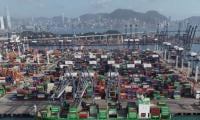Textile mills demand moratorium on gas, electricity bills
KARACHI: Textile mills on Thursday demanded of the government to freeze gas and electricity bills for the spinning industry for at least two months to help it underpin exports sector amid coronavirus that holds a potential recession risk.
All Pakistan Textile Mills Association (Aptma) said government should help the textile spinning industry by freezing gas and electricity bills for at least two months “so that the industry may operate without any interruption in these difficult times and also to avoid mass unemployment of the workers”.
Zahid Mazhar, chairman of Aptma Sindh-Balochistan region urged the government to take drastic measures to save export-oriented textile industry from the negative economic impact of novel coronavirus.
“Since its outbreak in mid-December 2019, coronavirus has caused turmoil in the world’s second-largest economy, China, with a trickle-down effect on nearly all big economies including European Union, United States, Japan and South Korea,” Mazhar said in a statement.
Aptma’s representative emphasised the need for immediate steps to address the major issues of the industry and exporters, especially the liquidity problem “otherwise all the measures taken by them for reduction in current account deficit would go in vain”.
Mazhar demanded the government to release the backlog of tax refunds, including deferred sales tax refund and payment of outstanding drawback of local taxes and levies.
“This is the money that belongs to the business and should speedily be returned to help uninterrupted operation of the industry enabling to sustain employment and exports,” he said. Aptma official said the present situation needs special attention of the government to address problems of the trade and industry at least for the period the recession would sustain due to coronavirus.
Mazhar demanded the government to restore zero-rated tax status for the five export-oriented industries to make them play role in the economic development through earning much-needed foreign exchange reserves. Aptma leader said the interest rate cut “was too little and too late”.
“Discount rates in the regional competing countries are between 4 to 8 percent, while discount rate has been reduced by United States of America to zero percent, Britain to 0.25 percent in sharp contrast with the present discount rate in Pakistan which is 12.5 percent,” he said. He demanded the State Bank to further reduce discount rate by another 300 basis points to help Pakistani exporters compete with regional competitors.
Aptma said availability of export refinance facility is the most important for spinning industry, which provides yarn on credit to all textile value-addition chains and store cotton for many months both through domestic buying and import from foreign suppliers. “Furthermore, due to cotton crop failure for the last five consecutive years, spinners are compelled to import costlier basic raw materials of textile industry, therefore the refinance facility (should) be provided also to the spinning industry on priority basis,” it added.
-
 ‘Miracle On Ice’ Redux? US Men Chase First Olympic Hockey Gold In 46 Years Against Canada
‘Miracle On Ice’ Redux? US Men Chase First Olympic Hockey Gold In 46 Years Against Canada -
 Friedrich Merz Heads To China For High Stakes Talks In An Effort To Reset Strained Trade Relations
Friedrich Merz Heads To China For High Stakes Talks In An Effort To Reset Strained Trade Relations -
 Astronauts Face Life Threatening Risk On Boeing Starliner, NASA Says
Astronauts Face Life Threatening Risk On Boeing Starliner, NASA Says -
 Hailey Bieber Reveals How Having Ovarian Cysts Is 'never Fun'
Hailey Bieber Reveals How Having Ovarian Cysts Is 'never Fun' -
 Kayla Nicole Looks Back On Travis Kelce Split, Calls It ‘right Person, Wrong Time’
Kayla Nicole Looks Back On Travis Kelce Split, Calls It ‘right Person, Wrong Time’ -
 Prince William And Kate Middleton Extend Support Message After Curling Team Reaches Olympic Gold Final
Prince William And Kate Middleton Extend Support Message After Curling Team Reaches Olympic Gold Final -
 Nvidia CEO Praises Elon Musk, Calls Him An ‘extraordinary Engineer'
Nvidia CEO Praises Elon Musk, Calls Him An ‘extraordinary Engineer' -
 Shia LaBeouf's Mugshot Released After Mardi Gras Arrest On Battery Allegations In New Orleans
Shia LaBeouf's Mugshot Released After Mardi Gras Arrest On Battery Allegations In New Orleans -
 Timothee Chalamet Felt '17 Again' After Reunion With 'Interstellar' Director Christopher Nolan
Timothee Chalamet Felt '17 Again' After Reunion With 'Interstellar' Director Christopher Nolan -
 Conan O'Brien Speaks First Time After Rob Reiner's Killing
Conan O'Brien Speaks First Time After Rob Reiner's Killing -
 Giant Tortoise Reintroduced To Island After Almost 200 Years
Giant Tortoise Reintroduced To Island After Almost 200 Years -
 Eric Dane Drops Raw Confession For Rebecca Gayheart In Final Interview
Eric Dane Drops Raw Confession For Rebecca Gayheart In Final Interview -
 Trump Announces New 10% Global Tariff After Supreme Court Setback
Trump Announces New 10% Global Tariff After Supreme Court Setback -
 Influencer Dies Days After Plastic Surgery: Are Cosmetic Procedures Really Safe?
Influencer Dies Days After Plastic Surgery: Are Cosmetic Procedures Really Safe? -
 Eric Dane Confesses Heartbreaking Regret About Daughters' Weddings Before Death
Eric Dane Confesses Heartbreaking Regret About Daughters' Weddings Before Death -
 Nicole 'Snooki' Polizzi Reveals Stage 1 Cervical Cancer Diagnosis
Nicole 'Snooki' Polizzi Reveals Stage 1 Cervical Cancer Diagnosis



